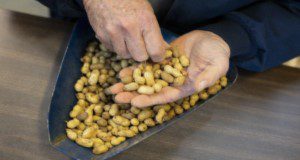Esta publicación proporciona información sobre azúcares y otros edulcorantes en la dieta estadounidense. La publicación describe fuentes ocultas de azúcares agregados en los alimentos para ayudar a aquellos que desean reducir la ingesta de azúcar, a encontrar los azúcares agregados en sus dietas. La sección sobre edulcorantes de alta intensidad analiza las características de cada edulcorante aprobado.
This is the Spanish translation of FSHN20-46/FS406, Nutrition for Health and Fitness: Sugar and Other Sweeteners. Written by Wendy Dahl and Linda Bobroff, translated by Daniela Rivero-Mendoza, and published by the UF/IFAS Food Science and Human Nutrition Department.
https://edis.ifas.ufl.edu/fs407
Tag: Food Health and Nutrition (en espanol)
Dietas populares: Ayuno intermitente
La pérdida de peso puede ser un desafío. Comenzar una dieta restrictiva puede ser agotador emocionalmente y difícil de cumplir. ¿Hay alguna forma más efectiva de perder peso? ¿El momento y la frecuencia de las comidas ayudan a perder peso? Esta publicación describe los beneficios y riesgos del ayuno intermitente para bajar de peso.
This new 4-page article is the Spanish language translation of FSHN20-47/FS409, Popular Diets: Intermittent Fasting, written by Michelle Yavelow, Daniela Rivero-Mendoza, and Wendy Dahl, translated by Daniela Rivero-Mendoza, and published by the UF/IFAS Food Science and Human Nutrition Department.
https://edis.ifas.ufl.edu/fs417
Dietas populares: Alimentos crudos
La dieta de alimentos crudos tiene sus raíces en un movimiento vegetariano que se remonta a los años 1800. Como su nombre lo indica, una dieta de alimentos crudos es un patrón dietético compuesto mayoritaria o completamente por alimentos crudos y sin procesar. Esta publicación explora los posibles beneficios y riesgos para la salud de una dieta de alimentos crudos.
This is the Spanish translation of FSHN20-45/FS404, Popular Diets: Raw Foods, written by Alexa Barad, Daniela Rivero-Mendoza, and Wendy Dahl, translated by Daniela Rivero-Mendoza, and published by the UF/IFAS Food Science and Human Nutrition Department.
https://edis.ifas.ufl.edu/fs415
Pérdida de peso y los adultos mayores: Riesgos y beneficios
A los adultos obesos a menudo se les aconseja perder peso para reducir el riesgo de enfermedades crónicas. Sin embargo, los beneficios para la salud de la pérdida de peso cambian a medida que envejecemos. Esta publicación analiza los riesgos y beneficios de la pérdida de peso planificada y no planificada para adultos mayores.
This is the Spanish translation of FSHN20-42/FS401, Weight Loss and the Older Adult: Risks and Benefits, written by Wendy Gans, Rachelle Savelle, Nancy Gal, and Wendy Dahl, translated by Daniela Rivero-Mendoza, and published by the UF/IFAS Food Science and Human Nutrition Department.
https://edis.ifas.ufl.edu/fs414
Criando niños saludables: Estado físico de la familia (FCS8892Span/FY1255)
 ¿Ser activo realmente hace una diferencia? ¡Sí! This 3-page fact sheet is the Spanish language version of Raising Healthy Children: Family Fitness. Written by Lisa D. Chan and Karla P. Shelnutt and published by the UF Department of Family Youth and Community Sciences, October 2011.
¿Ser activo realmente hace una diferencia? ¡Sí! This 3-page fact sheet is the Spanish language version of Raising Healthy Children: Family Fitness. Written by Lisa D. Chan and Karla P. Shelnutt and published by the UF Department of Family Youth and Community Sciences, October 2011.
http://edis.ifas.ufl.edu/fy1255
FCS1059b-Spn/FY415 La Importancia del Desayuno
FCS1059b-Spn, a 2-page fact sheet by Claudia Peñuela, is the Spanish language version of FCS1059b/HE550 The Importance of Breakfast, which describes the benefits of this most important meal of the day, gives some reasons why people skip breakfast, and makes healthy recommendations and ideas. Includes references. Published by the UF Department of Family Youth and Community Sciences, August 2009.
http://edis.ifas.ufl.edu/FY415
FCS1099Span/FY202 Elija Bocaditios Saludables Usando MiPirámide
Revised! FCS1099Span, a 2-page illustrated fact sheet by Claudia Peñuela and Isabel Valentin-Oquendo, is the Spanish language version of FCS1099/FY201 Choosing Healthy Snacks Using MyPyramid. It discusses healthy snacks, including snacking myths, who should snack, planning snacks, how to read food labels, and including food groups that are missing from meals. Published by the UF Department of Family Youth and Community Sciences, August 2009.
http://edis.ifas.ufl.edu/FY202



